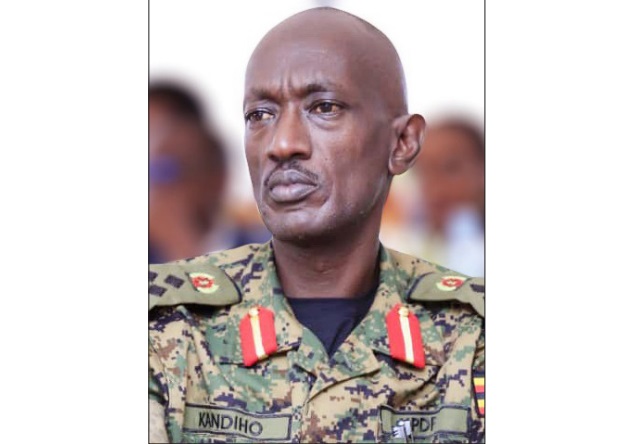
The United States on Dec.02 imposed sanctions on the head of the Chieftaincy of Military Intelligence (CMI), Maj. Gen. Abel Kandiho over alleged human rights abuses.
Kampala, Uganda | THE INDEPENDENT | Kandiho was hit with the sanctions over alleged human rights abuses, including for alleged torture and sexual abuse committed under his watch.
He was among more than a dozen people and entities in Iran, Syria and Uganda, who were sanctioned over allegations that they are connected to serious human rights abuses and repressive acts.
In an action marking the week of the U.S. Summit for Democracy, the Treasury Department said in a statement that it was targeting repression and the undermining of democracy, designating individuals and entities tied to the violent suppression of peaceful protesters in Iran and deadly chemical weapons attacks against civilians in Syria, among others.
“Treasury will continue to defend against authoritarianism, promoting accountability for violent repression of people seeking to exercise their human rights and fundamental freedoms,” Andrea Gacki, director of the Treasury’s Office of Foreign Assets Control, said in the statement.
The action freezes any U.S. assets of those blacklisted and generally bars Americans from dealing with them.
Washington blacklisted two senior Syrian air Force officers it accused of being responsible for chemical weapon attacks on civilians and three senior officers in Syria’s security and intelligence apparatus, according to the statement.
In Iran, the United States designated the Special Units of Iran’s Law Enforcement Forces and Counter-Terror Special Forces, as well as several of their officials, and Gholamreza Soleimani, who commands Iran’s hardline Basij militia. Two prisons and a prison director were also blacklisted over events that reportedly took place in the prisons.
Iran criticized the United States for imposing new sanctions.
Uganda’s military also said it is disappointment with U.S. sanctions against Kandiho but Ugandan rights activists welcomed them and said the U.S. needs to do more.
The Executive Director of the Foundation for Human Rights Initiative Uganda, Livingstone Sewanyana, said as activists, they have always advocated for targeted sanctions, which include travel restrictions for those responsible for the abuses.
“We need to go a step beyond that to ensure that these people comply,” said Sewanyana. “So, I think they are imposing those travel restrictions as a first step to secure some sort of commitment from the government of Uganda.”
UPDF spokesperson, Brig. Flavia Byekwaso, said Kandiho was not given a fair hearing by U.S. authorities before announcing what she described as unilateral financial sanctions.
Byekwaso, a brigadier general, said that as a country and the UPDF, in particular, they were disappointed that such a decision could be made by a country they consider friendly, a partner and a great ally.
She said the decision was made without due process and in total disregard of the principle of fair hearing, coupled with failure to make the necessary consultation.
The U.S. Treasury Department says Kandiho and other CMI officers targeted individuals due to their nationality, political views, or criticism of the Ugandan government.
After Uganda’s general elections in January, many young men who had previously been reported missing reappeared, detailing horrid tales of torture by security members.
The U.S. Treasury Department says individuals were taken into custody and held, often without legal proceedings, at CMI detention facilities where they were subjected to horrific beatings and other egregious acts by CMI officials, including sexual abuse and electrocutions, often resulting in significant long-term injury and even death.
It says in some cases, Kandiho was personally involved, leading interrogations of detained individuals.
But speaking to journalists on Dec.08, Kandiho said the sanctions were politically motivated and inconsequential. He said unilateral punishments imposed by the U.S. risked alienating its allies.
He says he has no business in the U.S. and was concentrating on threats in the region and says he will not allow his attention to be diverted.
`In August, while addressing the nation, President Yoweri Museveni blamed the torture on acts by individual officers and the failure of senior commanders to instruct junior officers on what should and shouldn’t be done.
Museveni promised to eliminate such torture and use the law to uproot the culture of reactionary behavior in the armed forces, though no action on this front has been evident.
****
 The Independent Uganda: You get the Truth we Pay the Price
The Independent Uganda: You get the Truth we Pay the Price


